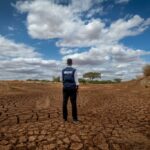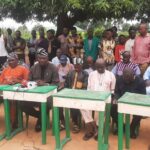By Olayinka Ajayi
Bola Akinterinwa, a professor of international relations at Achievers University, Owo, in this interview, wonders why democracy is working well elsewhere and not in Africa.
It’s no longer news that coups have become the new normal in Africa. What are your thoughts on this?
Intrinsic to your question is the assumption that there was a time when coups, coup-making, or coups d’état, whether successful or unsuccessful, were normal. If this assumption is not valid, there may not be a need to talk about an old normal and a new normal.
Never was there in the history and historiography of coups d’état in Africa a time when coup-making was condoned.
It has always been condemned.
You may wish to consider, for example, the cases of the Republics of Dahomey and Togo in 1963. The Dahomeyan government, which came to power following the independence of the country in August 1960, was overthrown by Christophe Soglo on October 28, 1963; in other words, in three years, two months after independence. In Togo, on January 1, 1963, President Sylvanus Olympio was not only overthrown but brutally murdered. Emmanuel Bodjollé was appointed Chairman of the Insurrection Committee.
The condemnation of both coups was widely objected to, and the position of Nigeria in the case of Togo had very serious foreign policy implications. For instance, Nigeria made it crystal clear, through the then Foreign Minister, Dr. Jaja Wachukwu, that the internationally accepted principle of non-interference and non-intervention in the domestic affairs of other sovereign states would be an exception to Nigeria’s foreign policy. So would the case of apartheid in South Africa.
Nigeria said apartheid could not be rightly said to constitute a domestic affair and that Nigeria could not simply be an observer and be watching the killing of an inestimable ally, a true friend of Nigeria, under the pretext of the rule of non-intervention principle as provided for under Article 2, paragraph 7 of the UN Charter. Consequently, what can be said to be the ‘old normal’ is still what currently exists.
However, this is not to suggest and dismiss by word of mouth the deductive wisdom in the notion of your ‘new normal.’ The opinion is increasingly becoming popular that there is a need to distinguish between good and bad coups. Before now, all coups were considered bad. Now, with the Gabonese coup, many people say it was not really a coup and that, in any case, the coup was a very welcome development.
This means that coups are now being clothed with ‘normalcy,’ the implication of which is that there will be permissible and non-permissible coups in the foreseeable future, by which time the concept of the new normal’ can be part of the political lexicon.
What then would you make of former President Olusegun Obasanjo’s statements, which analysts interpret as profound and appear to have set the tone for a debate on coups in Africa?
Reportedly, former President Olusegun Obasanjo said that there is a need for the African continent’s peoples to rethink democracy in light of his belief that the liberal democracy we currently copy from the West does not appear to be working well for Africa, especially in terms of democratic development, political stability, and national security.
For various reasons, the reported statement clearly reflects Chief Obasanjo as a former president and General Obasanjo as a former military head of state and government. The statement appears to have drawn largely from his experiences as a military leader who voluntarily returned power to the civilian rule of Alhaji Shehu Shagari in 1979. He put an end to the dictatorial regime he headed.
As a President, or as an elected President, and not as a military president in the mania of General Ibrahim Babangida, Chief Olusegun Obasanjo has shown that he has moved away from being a militarised civilian when he was a military Head of State to a civilianised military leader. The mere fact that he instructed the non-use of his military titles when he was elected president is a pointer to our observation here.
If we consider that since 2020, there has always been at least one coup d’état in Africa every year: Mali in 2020 and 2021, Burkina Faso and Guinea thereafter, and Niger and Gabon in 2023, there is no way questions should not be asked for purposes of understanding the dynamics.
The coups have essentially been within the Francophone world. The questions that naturally come to mind are clear: why is it that the Francophone world, which has always acquiesced to the whims and caprices until 2020, is now vehemently opposing their former colonial master, and for that matter, with the support of the people? Why are the coups limited to the Francophone world? Why is the ECOWAS and African Union’s policy of non-acceptance of unconstitutional changes of government disregarded by the affected Francophone countries? Why is democracy working well elsewhere but not in Africa? Is the liberal democracy practiced elsewhere different from the one being practiced in Africa? These are some of the questions that Chief Obasanjo’s quest to rethink democracy necessarily poses and that should be addressed.
Do you need to rethink democracy on the continent?
Yes, we need to, as a matter of desideratum. Please recall that democratisation fever was given birth as far back as 1990 during the sixteenth Franco-African Summit held in La Baule, France, from June 19th to 21st, 1990. At the summit, French President François Mitterrand made it clear that development aid would henceforth be given only to democracies and no more to dictators. Coups d’état were, by direct implication, outlawed.
The need for rethinking here stems from the fact of politicisation of democracy, especially because many dictatorial regimes in Africa were still given development assistance contrary to the declared policy. France was not alone in this double standard. The western democracies were all guilty.
Consequently, there is a need not simply for rethinking but particularly for engaging in critical thinking within the context of self-liberation and investigating how to improve Africa’s traditional system of democracy. I therefore have no qualms about rethinking democracy, especially in helping developed democracies see beyond their limits. Rethinking will help engage in comparative studies and draw lessons for all stakeholders.
Has the liberal democracy we are copying from settled societies in the West failed in Africa?
I do not think that the problem is a failure of democracy. In whichever way democracy is seen and defined, it cannot fail or pass. It is the handlers of democracy that can pass or fail depending on the attitudinal dispositions of the conductors and managers of democracy.
What makes people think of the failure of democracy is largely derived from foreign interference, which often stipulates specific or purportedly appropriate ways for good governance. The developed democracies want democracy managed according to their own defined democratic lifestyle, while the environmental conditions in Europe and Africa are not the same. For example, Africans are told to engage in structural adjustment programs and not give subsidies, etc., whereas they do precisely the opposite back home.
Again, the United States did not sign the ICC Rome Statute and never accepted the trial of any of its troops outside of America, but the same United States does not want other countries in Africa to do the same. Why is Africa told to do what will not be tolerated in developed democracies? Why should specific COVID vaccines be reserved only for Africa and never be exported elsewhere? Why is the democracy of COVID in Europe different from that in Africa?
Imagine again the debate and vote on the Russo-Ukrainian war at the UN General Assembly. The United States, in particular, did not expect African countries not to support the UNGA resolution that condemned Russia. Most African countries, indeed, abstained from voting to condemn Russia. Westerners described Russia’s attack on Ukraine as an invasion of Ukraine, but Russia says it is a special military intervention and not an invasion or even an aggression.
The point that is noteworthy here is that President Joe Biden of the United States declared that, henceforth, any country that votes against US foreign policy interests will be sanctioned. In your own view, Olayinka, is this an expression of democratic freedom? When do African countries begin to take instructions from the United States on how to vote and who to vote for? Why should Africa vote for US interests to the detriment of its own interests? This is why critical thinking is needed.
If it has failed, what is the alternative?
There is no alternative to democracy as a good system of political governance. What is needed is to train the minds of ruling Democrats to avoid recklessness, political chicanery, ethnic jingoism, and religious sentiments in the conduct and management of political governance. Democracy works with straight-forward minds, with objectivity, and with sincerity of purpose. The administration of democracy is currently and generally fraught with unfairness, injustice, manipulation of election results, and the presentation of untruths as truths. This is why democracy has not been working.
And perhaps more interestingly, the management of presidential democracy may be considered an alternative system. Parliamentary democracy, which is more directly representative and cheaper in terms of governance costs, can be another option. However, in all cases, it is the operational attitude toward any choice that determines the extent of anyone’s workability. All the systems are good in themselves.
You mentioned earlier about good and bad coups. When can we talk about good coups?
When a coup has a very selfish character, especially when it is clear that the protection of the national interest is not in the picture, such a coup can never qualify to be considered good. Good coups are generally supported by the people, not by a rented crowd, but when people spontaneously come out to rejoice, feeling a sigh of relief, not simply in one area of the country but in various parts and cities of the country. Good coups carry messages of approval from the people.
When governments perform well to the admiration of the general public, there will hardly be any thought of coup-making. In Niger, the people are fed up with perceived or alleged French exploitation of national resources, the deepening level of poverty among Nigériens, and bad management of national affairs. In Gabon, the Gabonese simply want to put an end to the Bongonisation of Gabon. In essence, when it is the people who want an unconstitutional change of government in the face of the inaction of the AU or the regional communities, it is a good coup.
The post The problem is not about democracy failure — Prof Akinterinwa appeared first on Vanguard News.





